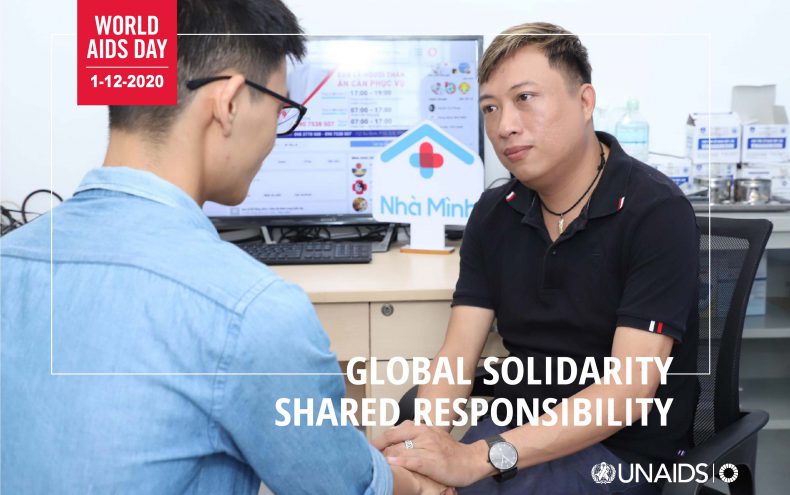Solidarity to end AIDS and defeat COVID-19: mobilization of communities’ strength
No one is safe until everyone is safe during a pandemic. The government, communities, and development partners in Viet Nam have joined hands to ensure treatment continuity and access to social protection services for HIV key populations during the COVID-19 outbreak. Solidarity is the cornerstone of an equitable national and global recovery.
“COVID-19 has brought forth solidarity among the community members,” said Nguyen Anh Phong, a representative of the Viet Nam Network of People Living with HIV (VNP+) in the south of Viet Nam and co-founder of the Lending a Helping Hand Fund.
COVID-19 upturned many lives especially hit the most vulnerable the hardest. People living with HIV faced difficulties accessing antiretroviral (ARV) medicine after the social distancing policy in mid-March 2020. Phong added, “We not only helped our citizen fellows but once assisted the cases that some foreigners living with HIV were trapped in Viet Nam and could not get ARVs.”
He and his VNP+ and key population peers reacted immediately and started connecting people through social media chatting platforms. The initiative helped address various emergency needs in access to ARVs, leveraging community networks, and resources. More than 150 community members joined the group across the country.
This community-based pandemic response has unfolded alongside the Viet Nam Authority for HIV/AIDS Control (VAAC) strategic planning and interventions for national HIV emergency response in the context of COVID-19, which has been supported by development partners including UNAIDS.
The collision of the COVID-19 pandemic and HIV epidemic has underscored the agility of the community-based response.
Soon after the COVID-19 outbreak, VAAC issued new guidelines on HIV care and treatment, including allowing for multi-month antiretroviral therapy refills for all people on HIV treatment and for the provision of pre-exposure prophylaxis and tuberculosis medicines.
Communities played an instrumental role as the extended arms of the health system. They promoted the new policies issued by the government among the communities via various communications tools. The joint-efforts allow HIV key-populations and health practitioners to be well-informed and benefit from the latest guidances.
National community networks of HIV key populations, such as people living with HIV, people who use drugs, transgender people, men having sex with men, sex workers, and young key populations, participated and sharing their resilience actions during the COVID-19 outbreak in a national technical consultation meeting. Serving as the forefront HIV service providers, the communities contributed constructive feedback on supporting communities to have continued access to HIV/health services.
“With the government’s openness and the improvement in policies over the past 30 years, the communities have grown much stronger and can contribute more to the program design and implementation. We are working together more as equal partners in the HIV response,” said Phong.
“Aspiring to serve and continue providing HIV services sustainably, I believe that the long-term investment from the government in the communities through social contracting mechanisms is the key.” Phong sees the need for sustainable funding. In 2017, he established the Lending a Helping Hand Fund to mobilize funding from supporting individuals and the private sector. “Calling for solidarity, the communities are responsible for showing the societies we are doing social good and for being transparent.”
“Many people are still unaware of how their health and well-being can be protected and where to get support. People who are being left behind and most in need of support often cannot have their voices heard,” Phong explained, “They chose to tell me their stories via my counseling channels on social media and telephone hotline. Every story motivates me to continue my efforts in calling on solidarity and altering the situation, despite all the challenges ahead.”
(*): Viet Nam Network of Men Having Sex with Men and Transgender People (VNMSM-TG), Viet Nam Network of People Living with HIV(VNP+), Viet Nam Network of People Who Use Drugs (VNPUD), Viet Nam Network of Transgender People (VNTG), Viet Nam Network of Young Key Populations (VYKAP), Vietnam Network of Self-Help Groups of Sex Workers (VNSW)




